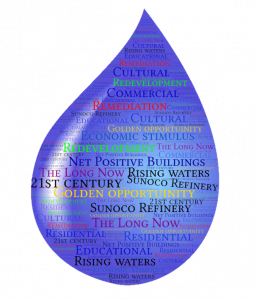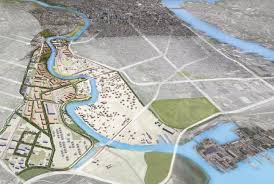Beginning in October 2017, the Philadelphia Eco-District Incubator, initiated a project coordinated by David Steinberg and Christopher Zelov to leverage the Regenerative Ecological Design ideas from our meetings and research to imagine the Green Transition applied to a prospective multi-billion dollar redevelopment of the 150 year old Refinery in South Philadelphia with the kind of ecological imagineering of Buckminster Fuller, Ian McHarg, and the Long Now Foundation. The project reveals that regenerative ecological design and economic development are not separate domains, and produce a synergetic prosperity for all to joyfully participate in.

Our project has developed The Philadelphia Eco-District Framework: A Proposed Cutting-Edge Framework in Support of Redeveloping the Philadelphia Refinery Site as an Aspirational Net Positive Human-Scale Regenerative Design Initiative from The Long Now Perspective. It is our hope that this framework, if used in redeveloping the approximately 1300 acre Refinery Site, would be a prototype for post-petroleum era development around the world.
Our work accelerated with Christina Simone’s September 2018 exhortation “Given the near-term potential for closure of refinery operations, stakeholders should begin exploring redevelopment options for the site” (see her report Beyond Bankruptcy: The Outlook for Philadelphia’s Neighborhood Refinery). The recent explosion and fire at the refinery have hightened our urgency to prepare this framework to guide Philadelphia and our civilization into the post-petroleum era with an urgent regenerative ecological design iniatiative.
Our framework features five pillars of consideration: (1) Aspirational Values So People Can Live, Work, and Play There, (2) Remediation: Repairing Environmental Damage, (3) Restoration: Bringing the Land Back For Eco-Humanist Uses, (4) Regenerativity: Creating an Environment That Gives Back More Than It Takes, (5) Designing Human Settlements: An Eco-District Model with a Mixed-Use Design Ethos.
This effort is on-going and necessarily incomplete. Here are a few of the key guideposts from our effort so far:
- Public-private partnership engaging Delaware Valley Regional Planning Commission (DVRPC), the Philadelphia Refinery Advisory Group, the Philadelphia City Planning Commission, PIDC, colleges and universities, the general public, and other stakeholders to redesign the refinery site to be an exemplar of the Net Positive℠ regenerative ideas of the Eco-District concept. The interests of past and future generations and the Long Now perspective ought to be engaged in all phases of the design process.
- Environmental remediation initiatives possibly including The Bio-Remediation Barge, sponge parks, Solar Acquatics, hybrid landscape ecologies, extending Fairmont Park into the site, wetland restoration, and other regenerative interventions to detoxify the land, water, and air so that the bounties of ecological wealth may be accrued on a long term basis. The goal ought to be to create a mythic landscape of restorative and regenerative ecologies.
- To facilitate the Green Transition to a Post-Petroleum Age, planning for the site ought to include long term perspectives, Net Positive℠ regenerative design, an EcoHumanist approach as outlined by Eco-District advisor William Cohen in his new book on the subject, and inspired Green design that puts the creative arts and people first.
- Multi-use redevelopment of the site including Green building opportunities for Arts and Creative Culture, Walkability, Recreation, Parkland, Community Development and Outreach, Green Housing to increase the population density of Philadelphia while mitigating climate change while also supporting a robust Entrepreneurial Business and Industrial element, Expanded public transportation for the site, cultural activites possibly including the honoring of the historical custodians of the site, the Lenni Lenape, and a World Peace Center.
- Cultural revival through landscape, design, and regenerative culture.

Click here to read the current version of the “Philadelphia Eco-District Framework”.